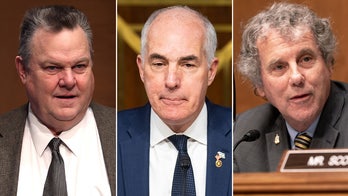
Matt Drudge is the founder of the popular online news site The Drudge Report, which has been charged by the Senate with spreading computer viruses. (AP)
The unusual e-mail sent to Senate staffers this week warning them not to visit The Drudge Report for fear of a virus has some critics crying foul, suggesting the missive is the latest attempt by Democrats to stifle dissent in the media.
The Drudge Report, a popular Web site which aggregates news links, often trumpets headlines critical of Democratic leaders. Known for getting insider news, Drudge's scoops on the primitive-looking site commonly show up in mainstream media coverage every day.
So when the Senate Sergeant-at-Arms sent out an e-mail warning those on Capitol Hill not to visit Drudge or whitepages.com because they "are responsible for the many viruses popping up throughout the Senate," conservatives objected.
"I suspect somebody was trying to make it look as if there's a virus there to discourage people from using Drudge," Sen. Jim Inhofe, R-Okla., told CNSNews.com. "Then, somehow, I guess someone in the Capitol got a hold of it and said, yes, we are advising you not to use it."
He said "the liberals, the extremists" want to obscure the stories that site founder Matt Drudge is featuring.
The Drudge warning was just the latest sign of what critics see as a flirtation with censorship.
Sen. Olympia Snowe, R-Maine, and Jay Rockefeller, D-W.Va., introduced a bill last year that would allow the president to take control of the Internet in the case of a "cybersecurity emergency." The Obama administration recently released details of a plan, drafted under the Bush administration, to secure the Internet from a range of threats.
The Obama administration also has made scolding the media, and dissuading others from following cable television news and blogs, somewhat of a routine during his presidency.
Just last month, Obama urged Democratic senators to "turn off" their televisions and extract themselves from the political jibber-jabber of the Internet.
"You know what I think would actually make a difference? ... If everybody here turned off your CNN, your Fox, your -- just turn off the TV, MSNBC, blogs and just go talk to folks out there instead of being in this echo chamber where the topic is constantly politics," Obama said.
That was after the administration spent several weeks last fall criticizing Fox News as a fake news outlet and encouraging its competitors to marginalize the network. Last September, in the middle of a big health care reform push, Obama used a string of major network and cable interviews to scold the media for playing up "rude" and "outrageous" political comments. That was in the wake of the "You lie!" outburst by Republican Rep. Joe Wilson during the president's health care address to Congress.
All the while, lawmakers on Capitol Hill have discussed options for lifting up the newspaper industry that include allowing publications to declare non-profit status -- a change that would raise a whole new set of concerns about newspapers' independence and ability to profit from political ads.
And ever since Obama took office, conservatives have warned that some officials -- both elected and appointed -- are interested in re-instituting some version of the so-called Fairness Doctrine, the long-abolished policy that would require broadcasters to provide opposing viewpoints on controversial issues.
Prominent Democratic senators were calling for the policy to be reinstated early last year, but after White House officials initially left the door open to such a change the Obama administration went on the record in opposition to bringing back the policy.
But in July the administration named an official to the Federal Communications Commission who two years earlier laid out a battle plan for liberal activists to target conservative talk radio stations.
The official, FCC chief diversity officer Mark Lloyd, covered the topics in a June 2007 report called "The Structural Imbalance of Political Talk Radio" and a subsequent essay called "Forget the Fairness Doctrine." As the name of the latter might imply, Lloyd says he does not favor reinstating the Fairness Doctrine, but his writings raised alarms at groups like the Media Research Center which consider the Fairness Doctrine an assault on free speech.
Brent Baker, the vice president for research and publications at the Media Research Center, referenced the Lloyd appointment in criticizing the Drudge e-mail.
"The Huffington Post is also a huge site visited by staff," Baker told FoxNews.com, questioning why Drudge was the only news site mentioned. "It actually has far more links to outside sources, outside videos that could be seen as potentially dangerous for viruses and worms."
Baker said it appears that "somebody is a little eager to match a culture of hostility to alternative media."
The Drudge Report noted that it served more than 29 million pages Monday without an e-mail complaint about "'pop ups,' or the site serving 'viruses.'" Drudge recorded hundreds of thousands of hits from congressional IP addresses last month.
A spokesman for the Environment and Public Works Committee said the Senate Help Desk cited the Drudge Report and whitepages.com only as possible examples of Web sites generating pop-up ads that might be the cause of a recent increase in virus infections.
"Our nonpartisan systems administrator notified both majority and minority staff that this issue had been brought to her attention," the spokesman said in a written statement. "It is still not exactly clear where the increase in viruses is coming from, and staff have been advised to be cautious with outside Web sites at all times."




